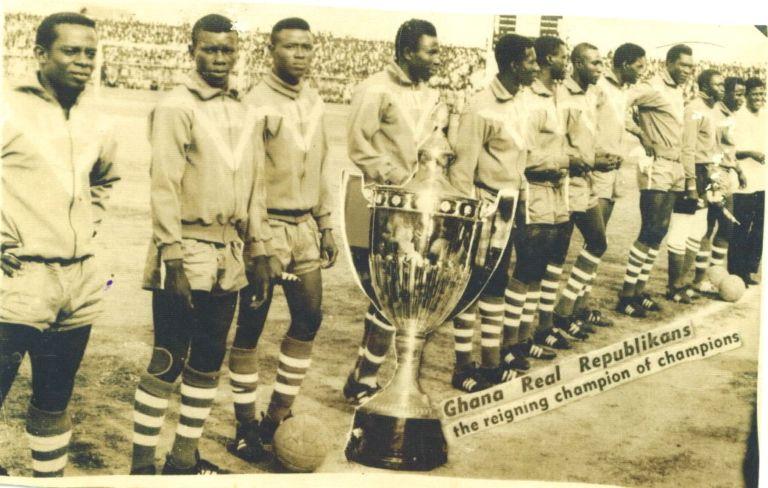
“Beyond the Pitch” is a riveting BBC World Service radio documentary that explores the close links between the “beautiful game” of football and the “dirty game” of politics in multiple African countries.
Produced by Farayi Mungazi and Penny Dale, the 50-minute feature aired on the eve of the 2017 Africa Cup of Nations (AFCON) in Gabon, which marks the 60th anniversary of the continent’s most prestigious sporting event.
The documentary opens with Nigeria’s boycott of AFCON 1996 in South Africa. The last-minute withdrawal of the Super Eagles came in retaliation for President Nelson Mandela’s scathing criticism of Nigerian dictator Sani Abacha’s regime, which in November 1995 had executed author Ken Saro Wiwa and eight more Ogoni environmental activists in a sham trial.
The next segment is captivating and among the most historically significant. It tells the story of how football helped Algeria’s struggle for independence from France through mesmerizing interviews with Mohamed and Khadidja Maouche. He was a young professional footballer in France in the late 1950s, but the newlyweds were also members of the National Liberation Front (FLN), the main Algerian liberation movement. The couple reveals how they secretly worked together to facilitate an exodus of Algerian-born footballers from their French clubs to play for the FLN “national” team. “No-one knew I was married to Maouche,” Khadidja says. “They would just be told a FLN activist wanted to speak to them. I would talk to them individually to say: ‘It’s an order, that’s it,’ and they all agreed.” In 1960 Mohamed Maouche eventually joined the FLN team, which played matches in front of large crowds in North Africa, the Middle East, East Asia, and Eastern Europe. “We were the first ambassadors of the revolution and the Algerian people,” he recalls with profound emotion half a century later.
Burundi’s current President Pierre Nkurunziza, a qualified football coach and owner of Hallelujah FC, is mentioned as a bridge to a terrific interview with Dr. Hikabwa Chipande, an historian and Michigan State University alumnus (PhD, 2015). Now a lecturer in African history at the University of Zambia, Chipande brings the BBC reporter through the archives in Lusaka where he conducted doctoral research on the history of Zambian football. As they look at sources documenting former president Kenneth Kaunda’s passion for and involvement in the game, Chipande points to a 1974 photograph of Kaunda serving food to the national team—quite an endearing, populist image. Mungazi then travels to Luanshya, on the Copperbelt, to talk football and politics with Dickson Makwaza, one of the players served by Kaunda in 1974, and with 91-year-old Tom Mtine, a legendary football administrator.
In the second half of the documentary we leap ahead to AFCON 2010 in Angola. The Togo national team bus was targeted by armed separatists from the enclave of Cabinda at the border with the Republic of Congo: “probably the most dramatic moment ‘off the pitch’ in the history of the Africa Cup of Nations,” Mungazi says. The armed attack killed two men and wounded several others: “one of the worst experiences I’ve had in my life,” said Togolese striker and English Premier League veteran, Emmanuel Adebayor.
The last time Uganda qualified for AFCON was in 1978 when the infamous Idi Amin was still in power. A local academic and former national team players explain how Amin, a keen boxer himself, bankrolled sports during his dictatorship (1971-79) to boost nationalism and also as a weapon of mass distraction. But we also hear of the traumatic experiences of John Ntensibe and Mama Baker. The former was imprisoned and forced to load bodies onto trucks after scoring the winning goal for Express FC against the army team, Simba, while Baker, a devoted Express supporter, was arrested twice for little more than being Uganda’s biggest soccer fan.
Fast forward again to the 21st century: we hear about George Weah, Africa’s only World Player of the Year (1995), who launched a career in politics in Liberia after retiring from the game. Weah lost a presidential election in 2004 (to future Nobel Peace laureate Ellen Sirleaf Johnson), but recently won a Senate seat and may run again for his country’s highest office.
The final chapter in the story of the links between politics and football focuses on Ghana. There, top clubs Accra Hearts of Oak and Kumasi Asante Kotoko have long been entangled in party politics and presidential contests. Veteran Ghanaian reporter Kwabena Yeboah also describes the emergence of Real Republikans, a super club of the 1960s closely connected to President Kwame Nkrumah. Subsequent regimes in Ghana, it is noted, used the men’s national team, the Black Stars, to strengthen their popularity and “perpetuate their reign.”
As a scholar who has been writing about African football history, culture, and politics for a long time, I found Farayi Mungazi and Penny Dale’s “Beyond the Pitch” documentary to be finely researched and evocatively presented through African voices. The producers did well to carefully bring out the game’s contradictory capacity to be a force for empowerment and disempowerment. What a great way to get ready for the upcoming 2017 AFCON in Gabon. And what a wonderful resource for teaching and research.
Click here to listen and download the podcast version of the documentary.
Tag: CAF
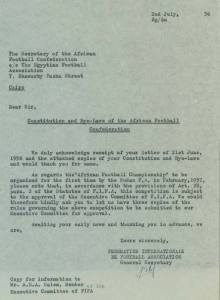
The 2015 African Nations Cup begins on January 17 in Equatorial Guinea. The oil-rich dictatorship, a former Spanish colony with a population of 736,000, agreed to host the tournament on short notice after Morocco pulled out due to fears related to the Ebola outbreak in West Africa.
Africa’s most important tournament is organized by the Confederation of African Football (CAF), a trailblazing pan-Africanist institution born at the dawn of the era of decolonization. Joining the world body, as I’ve written elsewhere, was an honorable, quick, and inexpensive way for newly independent nations to assert their full membership in the international community.
CAF took tangible shape at the 1956 FIFA Congress in Lisbon. There, delegates from Egypt, Sudan, and South Africa convened to draft a constitution and by-laws. The men also decided to organize a continental championship. Ethiopia was also involved in the discussions, but Yidnecatchew Tessema was unable to travel to Lisbon. The African proposal was later sent to FIFA for review and approval (see image at left).
On February 8, 1957, football officials from Sudan, Egypt, Ethiopia, and South Africa convened at Khartoum’s Grand Hotel to formally launch CAF. Fred Fell, a white man representing apartheid South Africa, was invited because his country was a member of FIFA and the Africans did not wish to be perceived as undiplomatic. In the meantime, the white South African football association gingerly debated the composition of the national team. However, the authorities Pretoria opposed a mixed selection and the white football establishment did not challenge the policy.
There are conflicting accounts about what happened next. CAF officials stated that they promptly excluded South Africa in a show of unequivocal pan-African solidarity. Fell and white South African football put forward a different story: they claimed they withdrew the team prior to any sanctions due to the team’s impending tour to Europe as well as security concerns linked to the ongoing Suez Crisis. Unfortunately, the minutes of the meeting at CAF were later destroyed in a fire so we may never know the exact truth of the matter. What is certain is that the South African issue did not disappear. To the contrary, the struggle against apartheid in football would become a powerful bond that united CAF and nearly all African nations for three decades.
South Africa’s absence in 1957 meant that only three teams, comprised of amateurs, participated in the inaugural African Nations Cup. Ethiopia, which had been drawn to play against South Africa, received a bye into the final. Egypt defeated hosts Sudan 2–1 and then dispatched Ethiopia 4–0 in the final watched by a crowd of 30,000 at the Stade Municipal. All four goals were scored by striker Mohammed Diab El-Attar “Ad Diba.” “Those were unforgettable matches,” Ad Diba recalled in an interview in 2001. “The success of this championship and its popularity amongst the Sudanese encouraged the African federation to organize a tournament on a biennial basis and to be played in a different country each time,” he said. Ad Diba made history again eleven years later in Addis Ababa, when he refereed the Afcon final between Congo (DRC) and Ghana (see video).
In those early days, CAF brought to life Kwame Nkrumah’s dream of a United States of Africa. At the same time, football provided a rare form of national culture, unity, and pride in postcolonial Africa.
Today, the African Nations Cup has transformed itself into a globalized commercial event with multinational corporate sponsors, matches on satellite television and online, many European coaches, and most players on the sixteen squads employed by European clubs. It is a far cry from 1957. And yet an alluring contradiction has endured: the Afcon showcases Pan-African solidarity while triggering 90-minute nationalism.
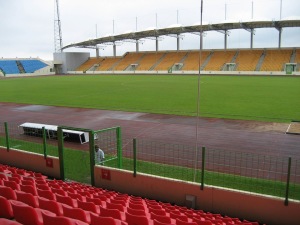
The Confederation of African Football has announced that Equatorial Guinea will replace Morocco as host nation for the 2015 African Nations Cup, the continent’s oldest and most prestigious international tournament.
The decision followed “fraternal and fruitful discussions” between CAF and Equatorial Guinea’s President Obiang, according to CAF’s official statement. Matches will be played in Malabo, Bata, Mongomo and Ebebiyin. The draw is scheduled for December 3 in Malabo.
The oil-rich former Spanish colony, population 736,000, previously co-hosted the tournament, with Gabon, in 2012.
CAF’s announcement brought a controversial and increasingly tense saga to a close. Morocco’s decision to back out of its commitment to stage the Nations Cup came in the wake of the Ebola outbreak in West Africa. The North African nation’s withdrawal drew passionate criticism from many fans and observers in Africa and overseas.
Writing for The Guardian’s Comment is Free, Sean Jacobs (the South African founder of the Africa Is A Country website) argues that “a mix of politics, opportunism and self-interest seem to be behind Morocco’s decision.”
The incident, Jacobs explains, is evidence of Morocco’s “difficult relationship with nations south of the Sahara. African migrants, some on their way to Europe, regularly complain about harassment, violence and xenophobia.”
James Dorsey’s The Turbulent World of Middle East Soccer blog took a similar tack. “Morocco can’t escape the impression that its decision was informed by prejudice,” especially within the context of a long and complex history of economic, cultural, and political relations between North African countries and sub-Saharan African nations. And, of course, fear shaped the decision as well. Fear, specifically, “about the possible impact of an Ebola case on tourism that accounts for an estimated ten percent of Morocco’s gross domestic product.”
Morocco’s seemingly contradictory decision not to host the Nations Cup in January but to go ahead and stage the FIFA World Club Cup next month sparked more criticism.
In the end, Africa’s grandest football show will go on thanks to Issa Hayatou, CAF’s president for the past 26 years, and President Obiang, Africa’s longest serving autocrat–in power since 1979 and at the head of the ruling Democratic Party of Equatorial Guinea that holds 153 of 155 parliamentary seats.
This last-minute African Nations Cup resolution reminds me of FIFA General Secretary Jerome Valcke’s statement during the massive 2013 Confederations Cup protests in Brazil: “less democracy is sometimes better for organizing a World Cup.” And, in this case, it seems to work for an African Nations Cup too.
Guest Post by Elliot Ross (@africasacountry)
1. This high-stakes knockout format might not be so bad after all. Qualifying groups are long, turgid affairs, especially the European ones, international football’s equivalent of the snoozetastic-but-moneyspinning UEFA Champions League group stages. Knockout football puts the big names at risk, as they should be. This past weekend was joyous.
2. Look out for the central African sides. I reckon DR Congo look a good early outside bet (remember current champions Zambia were 50-1 behind Burkina Faso and Libya before the 2012 tournament) and nobody will want to play Central African Republic — Egypt’s conquerors featured in this video — if Les Fauves manage to hold onto their slender 1-0 lead over Burkina Faso.
3. The Sudanese really know how to celebrate a goal. Watching big Sudan-Ethiopia games feels like being back in the 1950s. All we need is Ad-Diba to turn up with his whistle to referee the second leg.
4. Home advantage is everything. Just ask the Moroccans, the Angolans or the Cameroonians. On the flip side, it means all three of those teams will hold out hope of turning their ties around in October. It also means that despite their recent struggles Bafana Bafana can’t be discounted as serious contenders when South Africa host the tournament early next year.
5. Cabo Verde could have a big future in the African game, especially if they can prevent their top players from representing Portugal and other nations.
6. As Jonathan Wilson (@JonaWils) points out, Cote d’Ivoire’s defence looks a bit dodgy. Kolo Toure is seriously slowing down these days and former Dunfermline Athletic stalwart Sol Bamba might be a favourite of Sven Goran Eriksson, but he’s not the most positionally sound. Thankfully, Eboué has been restored by Sabri Lamouchi at the expense of the clunking Gosso. Hopefully, Seydou Doumbia will be next.
7. Papiss Demba Cissé is a genius. As the video above shows, the Senegalese striker scores goals most players wouldn’t dream of attempting.
8. Zambia have to be very careful in their second leg in Kampala. That encounter is going to be tense, and I’ve got a hunch Uganda will do a number on the African champs.
9. I miss Samuel Eto’o. What’s the price for his dramatic return in the second leg? If Eto’o does not show, then Cameroon look doomed. Whatever the internal drama behind this years-long row, it’s a dispute between a handful of soon-to-be-forgotten officials and one of Africa’s greatest footballers ever, and the result is to that a huge chunk of international matches is missing from his career and Cameroon are absolutely hopeless.
10. Remember the name: Christian Atsu. Is he the Ghanaian Messi? We don’t know but he looked tasty against Malawi and Porto’s scouts really know talent when they see it.
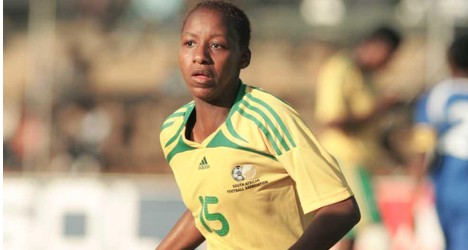
CAF announced that the final draw for the 2010 African Women’s Championship in South Africa will take place in Ekurhuleni (Gauteng) on 21 September. The tournament runs from 29 October to 14 November, with Equatorial Guinea (defending champions), Cameroon, Nigeria, Ghana, Algeria, Mali, Tanzania and hosts South Africa to be divided into two round-robin groups. The top two teams from each group advance to the semis.
But with barely a month to go we are still in the dark about where and when matches will take place. This inexcusable delay makes it more difficult for fans and media to participate in and cover the premier event in women’s football on the continent.
Meanwhile, South Africa’s women’s team, Banyana Banyana, lost 0-2 at home to Cameroon in its last match. Mail and Guardian blogger Siphiwe Hlongwane characterized it as ‘another painful reminder of how far behind we still are when it comes to the women’s game.’ Commenting on South Africa’s humiliating 10-1 loss to Germany in the Women’s Under 17 World Cup, my good friend Thabo Dladla noted in his column today: ‘You cannot have a national U17 team while girls are not playing football in primary school.’
Whether it’s properly hosting a major tournament, building competitive national teams, or developing youth football, for meaningful change to happen, as Hlongwane says, ‘Women’s football needs to be treated with respect.’
What Were They Thinking?!
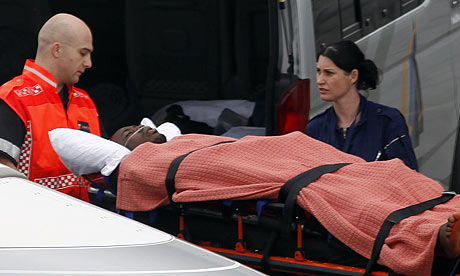
The Confederation of African Football (CAF) banned Togo from the next two African Nations Cup tournaments and also imposed a $50,000 fine. “This decision is outrageous,” said Togo captain and Manchester City striker Emmanuel Adebayor to the French newspaper L’Equipe on Sunday.
Togo returned home from the Nations Cup two days before the kickoff after two members of its delegation were killed in a terrorist attack on January 8 in Cabinda. CAF’s reason for punishing the victims is that it views the Togolese government’s decision to recall the team as ‘political interference’ in football affairs. The Togolese government intends to fight what it called the ‘insulting’ sanctions.
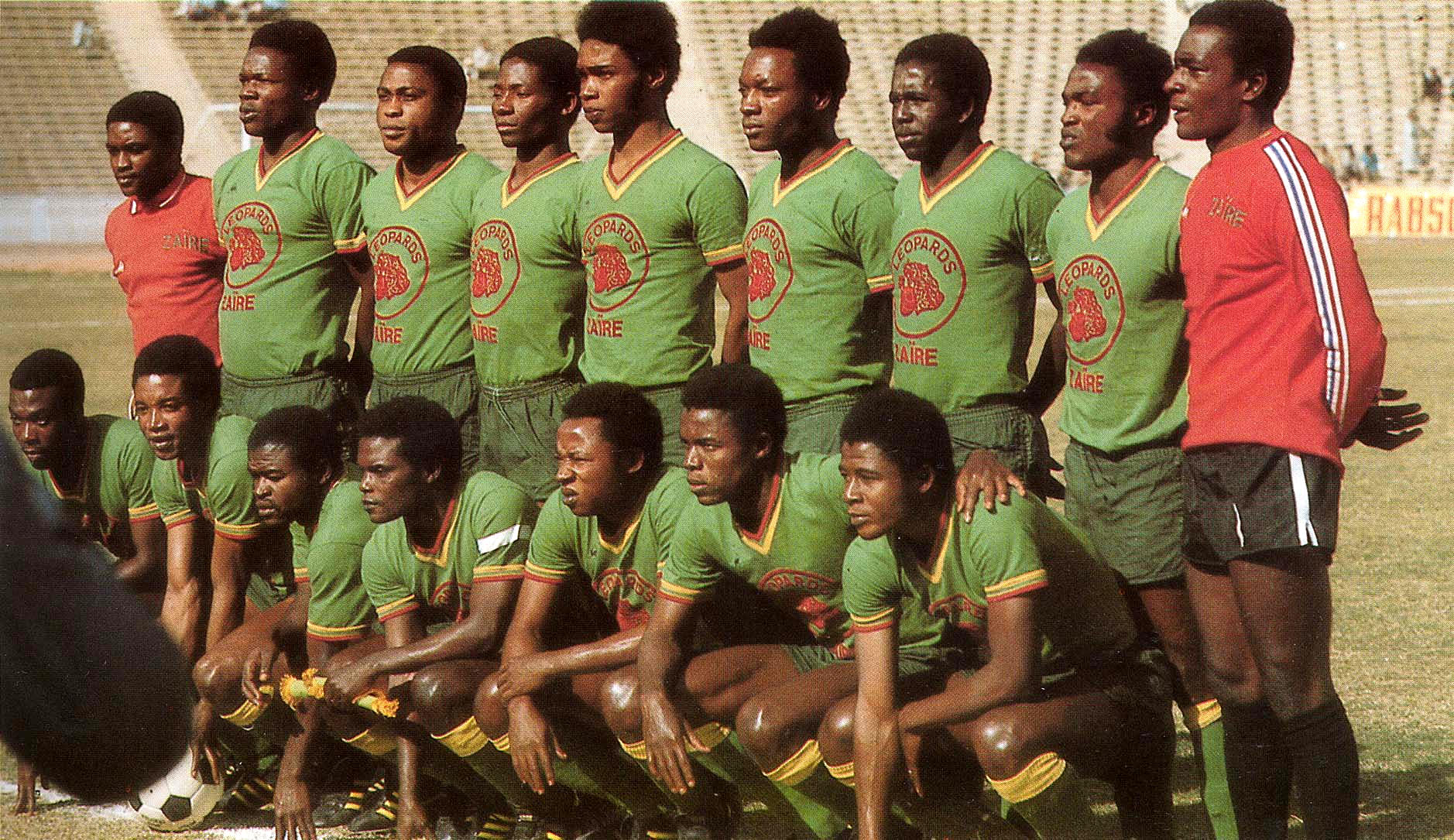
(Insert above. Zaire, Africa’s only representative in the 1974 World Cup Finals.)
(Please be aware the following is classic football anorak commentary. Davy considers how UEFA can best re calibrate its representation in future World Cups.)
Thirteen European nations will materialize in South Africa in 2010. Many deservedly so. Only five African nations will join them. I expect after the performances of Africa’s representatives, demand for a fairer apportioning of places in future World Cups will be irresistible and undeniable.
The fat is in the UEFA zone, as are the bigger television audiences and mobile credit card carrying supporters. Trimming UEFA representation in future World Cups could be a gristly experience. Asia and the Americas have sound claims also.